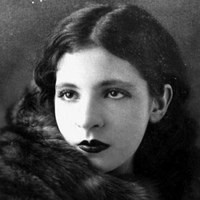São João da Boa Vista, 1910 – Santos (Brasil), 1962
By Marcelo Silva Souza

The life of the Brazilian artist, poet, novelist, left-wing activist, journalist, teacher, and translator Patrícia Rehder Galvão, known as Pagu, was as eventful as the many roles she played as a woman in early 20th-century Brazil. At the age of three, Pagu moved to São Paulo. At fifteen, she began contributing to newspapers, a profession she would maintain throughout her life. In 1928, the modernist poet Raul Bopp – who gave her the nickname Pagu, mistakenly thinking her name was Patrícia Goulart – introduced her to fellow poet and modernist Oswald de Andrade and his wife, the painter Tarsila do Amaral. Two years later, Pagu married Oswald, with whom she already had a son, Rudá de Andrade.
In 1931, she joined the Brazilian Communist Party (PCB) and was arrested in Santos for participating in a rally during a dock workers’ strike. The following year, she moved to an industrial workers’ village in Rio de Janeiro, where she fell ill and was helped by Oswald. In 1933, she published Parque industrial, considered the first Brazilian socialist novel and a precursor to the “social novel.” In it, she wrote: “[…] in all capitalist-threatened countries, there is a Brás” (referring to the São Paulo neighborhood, which had a high concentration of factories at the time). In 1935, she was arrested again, accused of involvement in the failed communist uprising led by Luiz Carlos Prestes, and was imprisoned for four years. During this period, she separated from Oswald.
After her release, she married for a second time in 1940, to Geraldo Ferraz. They had a son, Geraldo Galvão Ferraz. In 1949, she attempted suicide for the first time. The following year, she ran for a seat in the state legislature for the Brazilian Socialist Party. In 1962, she underwent a botched surgery in Paris and attempted suicide again. She died later that year, from cancer.
She published two novels (Parque industrial and A famosa revista, in 1945), a political pamphlet, as well as various poems and articles in the press. Her final poem, published three months before her death, on the eve of her trip to Paris, read: “Nothing nothing nothing / Nothing more than nothing / […] / I opened my arms to my old friends / Poets showed up / Some writers / Theater people / Weirdo’s at the airport / And nothing.”


